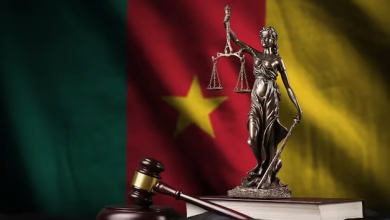Fugitives of Justice: Understanding INTERPOL Red Notices in High-Profile African Corruption Cases
By Bryan Miller | Legal Africa Magazine

The recent move by Ghana’s Office of the Special Prosecutor (OSP) to consider placing former Finance Minister Ken Ofori-Atta under an INTERPOL Red Notice has sent ripples through the legal and political corridors of West Africa. It raises a compelling legal question: What exactly goes into declaring someone an international fugitive? And what are the technical, legal, and diplomatic dimensions involved in such high-profile corruption investigations?
In this article, we delve into the legal mechanics of INTERPOL Red Notices, the domestic legal frameworks that support them, and how similar cases in Africa have unfolded in recent years.
The Ofori-Atta Case: A Snapshot
In early 2025, the Ghanaian Special Prosecutor declared Ken Ofori-Atta a once-powerful Finance Minister, a wanted person for failing to appear in corruption-related investigations. The allegations involved high-stakes contracts and public funds tied to ECG-BXC, Strategic Mobilisation Ghana Ltd, the National Cathedral project, ambulance procurements, and tax refund account management.
Though Mr. Ofori-Atta later agreed to appear before the OSP on June 2, 2025, the prosecutor’s office issued a clear warning: failure to comply would result in an INTERPOL Red Notice and potential extradition.
What Is an INTERPOL Red Notice?
A Red Notice is not an international arrest warrant. It is a formal request sent by INTERPOL to its 194 member countries to locate and provisionally arrest a person pending extradition, surrender, or similar legal action.
What It Requires:
-
A valid arrest warrant from the requesting country.
-
An active criminal investigation or conviction.
-
Submission to INTERPOL’s General Secretariat for legal and procedural vetting.
-
Adherence to INTERPOL’s constitution, which bars involvement in cases that are politically, racially, religiously, or military motivated.
This last condition becomes important in politically charged cases like Ofori-Atta’s, where the suspect may argue persecution or political targeting.
Legal Technicalities in Red Notice Requests
A domestic legal process must precede any Red Notice. In Ghana’s case, the OSP must show:
-
That Mr. Ofori-Atta is evading justice;
-
That due process has been followed in attempting to secure his presence;
-
That his absence is hindering investigations or prosecutions;
-
And that there’s a legitimate legal basis for prosecution.
The requesting country must also guarantee fair trial rights and non-political motivation, especially since many nations (especially in Europe) may deny extradition if these are in doubt.
Similar African Case Studies: Lessons from the Continent
1. Diezani Alison-Madueke – Nigeria/UK
Nigeria’s former petroleum minister faced massive corruption and money laundering charges. The Economic and Financial Crimes Commission (EFCC) pursued a Red Notice, and UK authorities arrested her in 2015. However, she was not extradited. A complex mix of UK laws, human rights concerns, and delays in Nigeria’s own court proceedings kept the case in limbo. As of 2025, she faces trial in London—not Nigeria.
2. Joseph Kabila’s Associates – DRC
After President Joseph Kabila stepped down, international probes targeted several of his allies. The Congo Files leak implicated high-ranking officials in looting over $138 million in state funds. Attempts to secure Red Notices failed as international authorities deemed the cases politically motivated.
3. Teodorin Obiang – Equatorial Guinea/France
Though not pursued via INTERPOL, Obiang, the Vice President of Equatorial Guinea, was tried in absentia in France for corruption and embezzlement in the “ill-gotten gains” case. France issued an arrest warrant, seized luxury assets, and convicted him. Yet, due to diplomatic immunity and political protection at home, he remained untouched by local prosecution.
Why Red Notices Often Fail in Africa
While Red Notices are powerful, their success depends on:
-
Political neutrality in investigations;
-
Judicial independence in the requesting state;
-
Treaties and bilateral extradition agreements;
-
Public pressure or media scrutiny (which can compel action or backlash);
-
The suspect’s location—some countries won’t extradite nationals or cooperate for political reasons.
What Happens Next in the Ofori-Atta Case?
At the time of this writing, Mr. Ofori-Atta has agreed to appear before the OSP. If he complies, INTERPOL involvement will be suspended. However, if he reneges, Ghanaian authorities may trigger cross-border legal mechanisms—though success would depend on:
-
His country of residence,
-
Ghana’s legal preparation,
-
INTERPOL’s approval,
-
And international diplomatic cooperation.
Conclusion: The Thin Line Between Justice and Politics
INTERPOL Red Notices are one of the sharpest tools in international law enforcement—but they are not immune to misuse, overreach, or failure. African nations pursuing justice for grand corruption must tread carefully: ensuring transparency, lawful processes, and non-political motivation.
The Ofori-Atta investigation will test Ghana’s legal maturity and its commitment to rule of law. For the rest of Africa, it’s yet another reminder that justice—especially across borders—requires more than just legal firepower. It demands strategy, credibility, and international trust.
By Legal Africa Magazine – Chronicling Law & Justice on the Continent
For interviews, legal insights, and corruption tracking in Africa, subscribe to Legal Africa or contact us at info@legalafrica.org.




